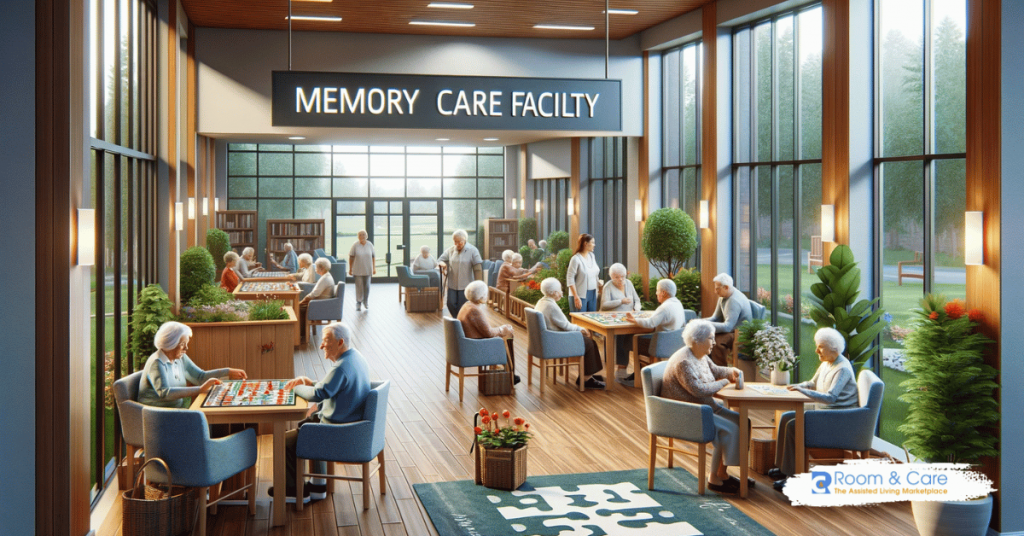Charlotte Memory Care: Quality Elder Living with Memory Care Expertise
Charlotte Memory Care: Quality Elder Living with Memory Care Expertise
Blog Article
Developing a Safe and Helpful Environment: In-Home Memory Treatment Fundamentals
Establishing a nurturing and secure setting for people requiring at home memory care is critical to their health and lifestyle. From making sure security within the space to using efficient interaction strategies and executing memory-friendly layout aspects, there are important parts that add to an all natural treatment approach. By concentrating on creating a helpful community that accommodates the distinct demands of those with memory impairments, caretakers can substantially boost the everyday experiences of their enjoyed ones.

Safe Living Setting
Creating a protected and hazard-free living environment is critical when supplying at home memory treatment for people with cognitive disabilities. Guaranteeing the security of the private with memory loss is vital to protect against accidents and promote a feeling of health.
In addition, utilizing technology such as activity sensors and alarms can alert caretakers if the private wanders or is in distress. By focusing on security measures and getting rid of possible risks, caretakers can offer a supportive and secure atmosphere for individuals with cognitive problems receiving at home memory treatment.
Effective Interaction Strategies
Applying tailored interaction techniques is essential in cultivating meaningful interactions with people with cognitive disabilities in the context of at home memory care. Efficient interaction plays a vital role in producing a supportive atmosphere that boosts the well-being and high quality of life for people with memory issues. When communicating with someone experiencing cognitive decrease, it is necessary to use straightforward and clear language, preserve a tranquility and positive tone, and offer aesthetic hints to aid comprehension.
One secret approach is to practice active listening, revealing compassion, patience, and respect during conversations. Non-verbal hints such as faces and body language can likewise assist communicate understanding and assistance. In addition, using memory treatment by using or going over previous experiences songs and art can take advantage of long-term memories, sparking links and boosting engagement.
Furthermore, including normal regimens and regular communication patterns can give a feeling of experience and protection for people with memory impairments. By carrying out these interaction techniques, caretakers can establish meaningful connections and advertise a feeling of convenience and trust in the at home memory care setup.
Memory-Friendly Style
Provided the relevance of developing an encouraging environment for individuals with memory problems through efficient communication methods, the consolidation of memory-friendly design components in the space ends up being essential in optimizing their day-to-day experiences and total wellness. Memory-friendly design concentrates on enhancing safety, comfort, and freedom for individuals with cognitive impairments. Basic adjustments can make a considerable difference, such as making use of contrasting colors to boost exposure and lower confusion, including clear signage to assist navigation, and decreasing clutter to avoid sensory overload.
Integrating familiar aspects from the person's past, such as personal photos navigate here or favored items, can evoke favorable memories and produce a feeling of familiarity. In addition, guaranteeing ample lighting degrees, mounting grab bars in restrooms, and applying non-slip flooring can help prevent falls and injuries. Developing a comforting and relaxing atmosphere via making use of familiar fragrances, soft appearances, and tranquil audios can also promote leisure and lower agitation. By integrating these memory-friendly style components, caregivers can offer a risk-free and encouraging home that makes it possible for individuals with memory issues to maintain their self-reliance and lifestyle.
Daily Routine Planning
When developing a day-to-day regimen for individuals with memory concerns, cautious planning is crucial to support their cognitive feature and general well-being. Developing a structured timetable can help lower disorientation, complication, and anxiousness commonly experienced by those with memory problems.
Adaptability is essential, as some days might need modifications based on the person's mood and energy levels. Routinely reviewing and adjusting the everyday schedule will certainly help ensure its effectiveness in advertising a favorable and soothing atmosphere for individuals with memory difficulties.
Support Group Implementation
Developing a durable network of encouraging individuals plays a critical function in enhancing the top quality of care and health for people needing memory assistance. Relative, pals, medical care experts, and neighborhood resources can all contribute to creating a strong assistance system. Communication among these people is necessary to guarantee that the needs of the specific with memory obstacles are satisfied efficiently.
Relative are frequently the key caretakers and form the foundation of the support system. They provide everyday care, psychological support, and friendship. When needed to stop burnout and make sure the best possible treatment for their liked one., it is crucial for family participants to seek help and break.
In addition to household assistance, involving health care specialists such as specialists, registered nurses, and medical professionals can offer specific treatment and advice. These professionals can provide useful understandings, clinical suggestions, and help in managing the person's problem.

Conclusion
Finally, producing a risk-free and encouraging setting for individuals with memory care requirements is necessary for their health. By developing a secure living setting, making use of efficient interaction approaches, including memory-friendly layout components, preparing everyday routines, and executing a strong support system, caregivers can help improve the lifestyle for those with amnesia. These vital parts function together click now to create a nurturing and encouraging environment that promotes self-reliance and improves overall lifestyle.
Producing a hazard-free and protected living environment is paramount when giving in-home memory treatment for people with cognitive disabilities. By prioritizing security actions and eliminating prospective threats, caretakers can give a safe and helpful setting for individuals with cognitive problems getting at home memory treatment.
Establishing a durable network of supportive people plays an essential role in boosting the high quality of treatment and wellness for people requiring memory assistance - Charlotte Memory Care. Communication amongst these individuals is essential to make certain that the requirements of the individual with memory obstacles are satisfied effectively

Report this page